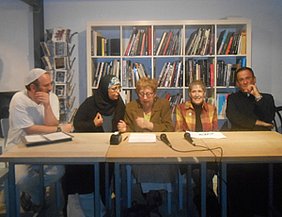The event took place in the Museum on the Seam with six speakers, two from each of the three faiths represented, and musical interludes.
Dr Deborah Weissman, ICCJ's Immediate Past President:
We are gathered together here in our beautiful and beloved city of Jerusalem in a time of great tension. We are six people, a man and a woman from each of the three Abrahamic traditions. We have gathered for two purposes—to offer prayers for peace and to be together, to show that it is possible for us to sit together around the same table and to listen to one another. Religion doesn’t have to be a force for violence and extremism; it can be an area of common values and common aspirations.
Exactly two weeks ago tonight, we celebrated the festival of Simchat Torah, when we complete the reading of the 5 Books of Moses and then begin anew. The first two Portions of the Week, which represent the first eleven chapters of Genesis, describe a universal approach—Creation, the Flood, and so on. Only in this coming week’s Portion, Lech L’cha, do we have the introduction of the story of Abraham, which later turns into the story of the Israelites. Rabbi Joel Levy in his opening prayers showed us a wonderful model of balance between the particular and the universal.
I would suggest that this balance is also present in a famous statement by our sage Hillel in Mishnah Avot: “If I am not for myself, who will be for me? But, if I am for myself alone, what am I? And, if not now, when?”
I sometimes paraphrase this to adapt it as a motto for the Jewish people: “If we are not for ourselves, who will be for us? But, if we are for ourselves alone, what are we? And, if not now, when?”

Rev. Fr. David Neuhaus SJ, Patriachal Vicar at the Latin Patriarchate of Jerusalem:
We are gathered here to pray for peace, Jews, Christians and Muslims. Together we raise our voices to God our Creator, and in the words that reflect our different but related traditions, we ask God to bless us with peace.
What in fact are we doing when we pray for peace? Let us first make quite clear what we are not doing: Surely we are not informing God about the sad state of the world. God knows about that a lot better than we do. Surely we are not telling God what God should be doing. We can trust that God knows better than we do what to do.
Prayer is first and foremost a time of personal transformation. When I pray for peace, I ask to be made an instrument of that peace, a peace maker. In asking for that grace, I realize how much violence, war and terrorism there is within me. I identify how much my own being, my words and my acts do not correspond to what I am praying for.
I ask that I might have the courage of my convictions. I ask that my thoughts, my words and my acts – what I do and what I fail to do correspond to the prayer that I am formulating. I ask that I might be filled with God’s own breath, the Spirit of peace, and serve as an apostle of that Spirit, bringing peace wherever I go.
However, prayer is also a communal act. When we pray for peace in our communities, we must similarly become aware of how our communities contribute to the lack of peace and ask forgiveness. We must come into prayer humbly with an attitude of repentance for all that we, as community, have contributed to the sorry state of the world.
We ask that the moment of prayer might be a prophetic moment in which we see beyond the walls that we have constructed, towards the alternatives, the possibilities, the new horizons that lie beyond the walls. We ask for an outpouring of Spirit that can make our communities builders of bridges instead of walls.
Finally, when we pray as we are this evening, Jews, Christians and Muslims together, we stand before our Lord, our Creator, our heavenly King. We must realize that in God’s sight, we are all God’s beloved children. In God’s sight, we must call each other brothers and sisters or else we are betraying the one who created us and breathed into us the breath of life.
For more information see the article „On the seam of still-divided Jerusalem, faith leaders ‚Imagine‘ peace“ published in The Times of Israel on October 29, 2014

